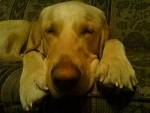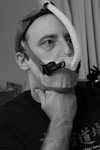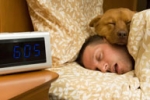I visited with my doctor today and have an at home sleep study scheduled for next week to see if my body has resolved the issues causing central apneas and I no longer need the supplemental oxygen that I have been on for the past year. It was his thought that since I have probably had sleep apnea my entire life that my body was used to not breathing hence causing the centrals to occur.
He did tell me today that if I still have central apenas that I will need to start a different type of therapy... the only other therapy I know of is an ASV machine. But in no way am I an expert on this subject.
What is so different about an ASV type machine than a standard APAP machine? I am really anxious about starting a different type of therapy after all the issues I had starting out on CPAP and now being 100% adjusted to the hosehead life starting over scares me.
Anyone have any insight they could provide?
Thanks,
Rome
Question about ASV... it may be in my future
- RomeinDNVR
- Posts: 124
- Joined: Tue Oct 18, 2011 8:44 am
- Location: Hudson, WI
Question about ASV... it may be in my future
_________________
| Machine: PR System One REMStar 60 Series Auto CPAP Machine |
| Mask: Wisp Nasal CPAP Mask with Headgear - Fit Pack |
| Additional Comments: PR Everflo Oxygen Concentrator - 2LPM |
- JohnBFisher
- Posts: 3821
- Joined: Wed Oct 14, 2009 6:33 am
Re: Question about ASV... it may be in my future
I really ought to put this together as a Wiki article.RomeinDNVR wrote:... What is so different about an ASV type machine than a standard APAP machine? I am really anxious about starting a different type of therapy after all the issues I had starting out on CPAP and now being 100% adjusted to the hosehead life starting over scares me. ... Anyone have any insight they could provide? ...
Okay, let me give you a short lesson on xPAP therapy (focusing on ASV therapy).
As you are aware, CPAP stands for Continuous Positive Airway Pressure. Initially there was just CPAP. Then they realized that some people need a different inhalation pressure than their exhalation pressure. So, BiLevel (or BiPAP) therapy was created. BiPAP is trademarked by Respironics. VPAP (Variable Positive Airway Pressure) is the term that Resmed uses.
Unfortunately, some people require different pressures based on their position. Those patients sometimes find Auto CPAP (or APAP) to be helpful. Then the manufacturers realized that an auto feature on BiLevel therapy would also be helpful.
However, in all these therapies the upper pressure is fixed. It won't go any higher.
The problem with someone that has Central Sleep Apnea is that their bodies experience an undershoot / overshoot cycle. First, for some reason that tends to differ from patient to patient, they tend not to breathe enough. Either the breathing is too shallow or it just does not occur. Regardless of the reason, this undershoot side of the cycle tends to cause CO2 to build in the blood stream. Surprisingly, our bodies measure the acidity (and thus indirectly the CO2 levels and not the O2 levels) in our blood. As CO2 builds due to a lack of respiration the O2 levels typically also drop. The CO2 level builds to a point that the body rouses enough (an arousal from lower level of sleep to a higher level of sleep) to kick in the normal breathing cycle. But it's not *really* normal. You see, with the extra CO2 our bodies hyperventilate a little. This is the overshoot side of the cycle. We breathe a little faster than normal and blow off too much CO2. This then suppresses normal respiration (the acidity in the blood drops to the point our normal respiration is suppressed). This overshoot side of the cycle sets up the undershoot side of the cycle. With the suppression of respiration a central apnea occurs and suddenly we are on the undershoot side of the cycle. Repeat frequently. Repeat constantly.
So, how do you break this undershoot / overshoot cycle? Well, if you are in a central apnea (not breathing either at all or enough), then by increasing the pressure you can help ventilate the person using xPAP therapy to help reduce the CO2 in their blood stream. This helps kick out the culprit of this undershoot / overshoot cycle. By following our respiration it acts as an adaptive-servo ventilator (ASV). That is, it adapts to our breathing (adaptive). It follows our breathing (servo). And it helps sustain breathing (ventilator).
As you might imagine, when the pressure ramps up it takes a LOT to adjust to using an ASV unit. However, it is a true godsend!! It's not unusual to see AHI numbers drop into the single digits - or even zero. But it takes typically two to three months to adjust to how the ASV works. But once you adjust to it, you will be amazed at how much difference it can make.
Hope that helps.
_________________
| Mask: Quattro™ FX Full Face CPAP Mask with Headgear |
| Additional Comments: User of xPAP therapy for over 20 yrs. Resmed & Respironics ASV units with EEP=9cm-14cm H2O; PSmin=4cm H2O; PSmax=15cm H2O; Max=25cm H2O |
"I get up. I walk. I fall down. Meanwhile, I keep dancing” from Rabbi Hillel
"I wish to paint in such a manner as if I were photographing dreams." from Zdzisław Beksiński
"I wish to paint in such a manner as if I were photographing dreams." from Zdzisław Beksiński
Re: Question about ASV... it may be in my future
If you need an ASV, get it! It's weird at first, but worth it.
_________________
| Humidifier: S9™ Series H5i™ Heated Humidifier with Climate Control |
| Additional Comments: Actually a S9 VPAP Adapt, and Respironics M Series Auto BiPAP |
- The Sheikh
- Posts: 165
- Joined: Sun Aug 19, 2012 12:22 pm
Re: Question about ASV... it may be in my future
Another description of ASV:
For someone who has stopped breathing due to a central apnea, picture the ASV machine like someone giving artificial respiration to the victim. The forced air expands the lungs. However, the lungs must contract on their own since the pressure never goes below zero - there is no negative pressure to help contract. But this appears to be no problem since a balloon will naturally collapse once the air is released, just like a lung.
When using my own ASV machine, I can feel the constant CPAP pressure, just like any other CPAP machine. But if I intentionally stop breathing, the "breath pulses" start up and pace my breathing rate. If we breath on our own, the pulses are hardly noticable. But if we stop, it's like a little companion reminding us to breathe, whether we are awake or asleep.
I am convinced that nighttime ASV use has also improved my daytime breathing rhythm too. I had daytime central apneas where I became lightheaded. Now breathing seems more consistent. Even though sleep and awake states use two different biological breathing systems, I think there may be some muscle memory overlap.
Tom
For someone who has stopped breathing due to a central apnea, picture the ASV machine like someone giving artificial respiration to the victim. The forced air expands the lungs. However, the lungs must contract on their own since the pressure never goes below zero - there is no negative pressure to help contract. But this appears to be no problem since a balloon will naturally collapse once the air is released, just like a lung.
When using my own ASV machine, I can feel the constant CPAP pressure, just like any other CPAP machine. But if I intentionally stop breathing, the "breath pulses" start up and pace my breathing rate. If we breath on our own, the pulses are hardly noticable. But if we stop, it's like a little companion reminding us to breathe, whether we are awake or asleep.
I am convinced that nighttime ASV use has also improved my daytime breathing rhythm too. I had daytime central apneas where I became lightheaded. Now breathing seems more consistent. Even though sleep and awake states use two different biological breathing systems, I think there may be some muscle memory overlap.
Tom
_________________
| Machine: ResMed AirCurve 10 ASV Machine with Heated Humidifier |
| Mask: Apex Wizard 310 Nasal CPAP Mask |
| Humidifier: S9™ Series H5i™ Heated Humidifier with Climate Control |
| Additional Comments: ResMed Adapt SV (ASV), PR AutoSV Advanced ASV, with SleepyHead, CMS-55H Oximeter and ZEO sleep monitor |
-
StillAnotherGuess
- Posts: 132
- Joined: Sat Apr 23, 2011 4:26 pm
Re: Question about ASV... it may be in my future
ResMed has a long documented history that ASV therapy can, in many cases, preclude the use of supplemental O2. if this is the 'new' therapy your doctor is thinking of, you will want the ResMed Adapt. Not the PR-1 autoSV Advanced.RomeinDNVR wrote:Anyone have any insight they could provide?
_________________
| Mask: Quattro™ FX Full Face CPAP Mask with Headgear |
| Additional Comments: S9 Adapt for Home and Travel, On-Board Firmware, Std. Tubing. EEP 9.8, Min PS 4.6, Max Pressure 21 |
- RomeinDNVR
- Posts: 124
- Joined: Tue Oct 18, 2011 8:44 am
- Location: Hudson, WI
Re: Question about ASV... it may be in my future
John, thanks for the great info much appreciated!
I feel better about the situation, hopefully my sleep study(s) will show positive results with out the O2.
I feel better about the situation, hopefully my sleep study(s) will show positive results with out the O2.
_________________
| Machine: PR System One REMStar 60 Series Auto CPAP Machine |
| Mask: Wisp Nasal CPAP Mask with Headgear - Fit Pack |
| Additional Comments: PR Everflo Oxygen Concentrator - 2LPM |
- JohnBFisher
- Posts: 3821
- Joined: Wed Oct 14, 2009 6:33 am
Re: Question about ASV... it may be in my future
O2 is an old approach to try to address central sleep apnea. But all it really does is attempt to keep the O2 level high in the blood stream. In fact, it does not really help reduce the CO2 build up. It does not address the basic problem - that you stop breathing. The ASV unit (from either Resmed or Respironics) will do that. It helps break the cycle of undershoot / overshoot of your breathing during your sleep.RomeinDNVR wrote:John, thanks for the great info much appreciated!
I feel better about the situation, hopefully my sleep study(s) will show positive results with out the O2.
_________________
| Mask: Quattro™ FX Full Face CPAP Mask with Headgear |
| Additional Comments: User of xPAP therapy for over 20 yrs. Resmed & Respironics ASV units with EEP=9cm-14cm H2O; PSmin=4cm H2O; PSmax=15cm H2O; Max=25cm H2O |
"I get up. I walk. I fall down. Meanwhile, I keep dancing” from Rabbi Hillel
"I wish to paint in such a manner as if I were photographing dreams." from Zdzisław Beksiński
"I wish to paint in such a manner as if I were photographing dreams." from Zdzisław Beksiński
Re: Question about ASV... it may be in my future
And don't get too worried about having to adjust to a new machine... I am sure it isn't easy for everyone, but neither is it hard for everyone. In my case, it was a piece of cake. I had to add a chin strap, but other than that, no problem. My machine feels like this sensitive creature paying extremely close attention to every single breath and instantly adjusting.
_________________
| Mask: Swift™ FX Nasal Pillow CPAP Mask with Headgear |
| Humidifier: S9™ Series H5i™ Heated Humidifier with Climate Control |
| Additional Comments: ResMed S9 VPAP Adapt SV |











